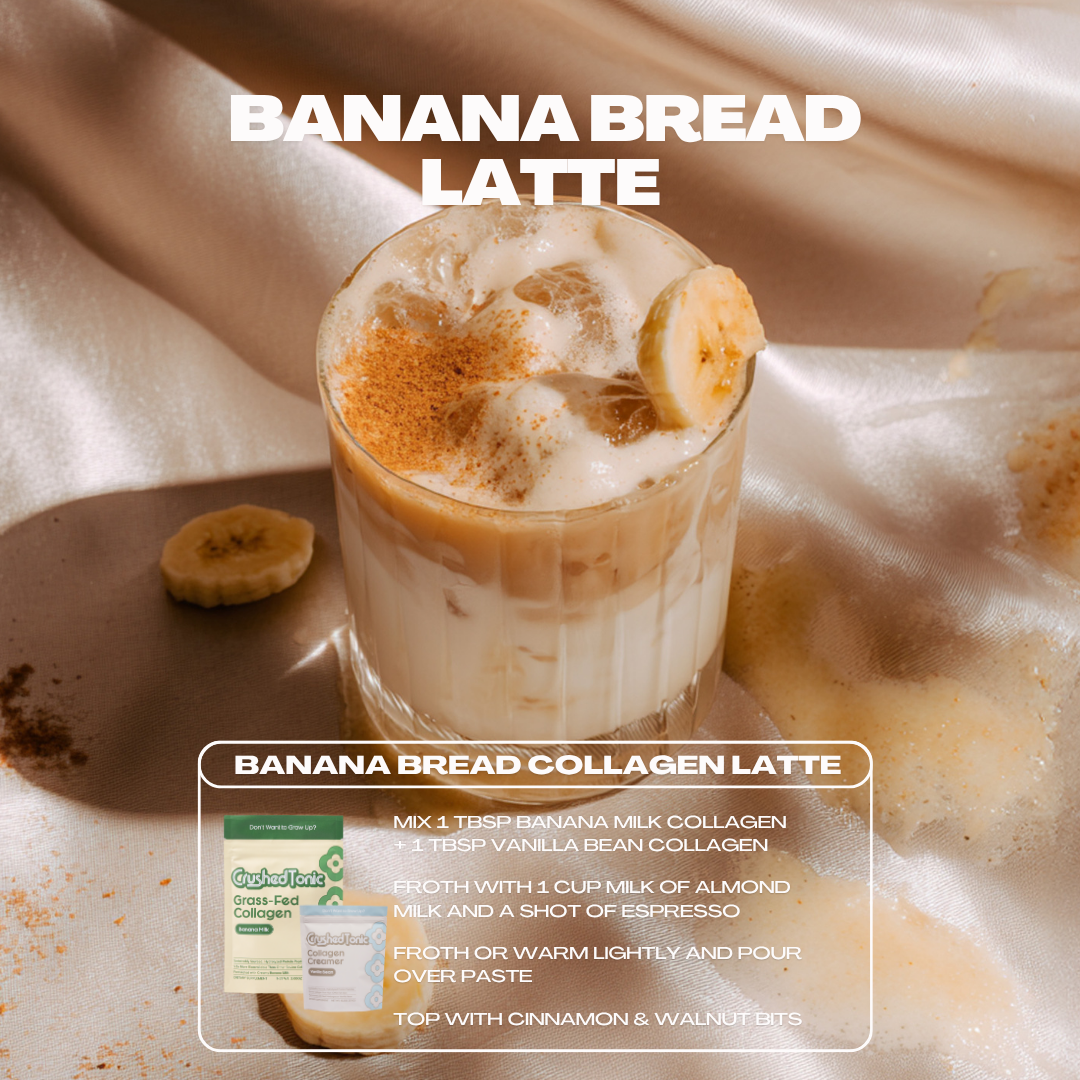
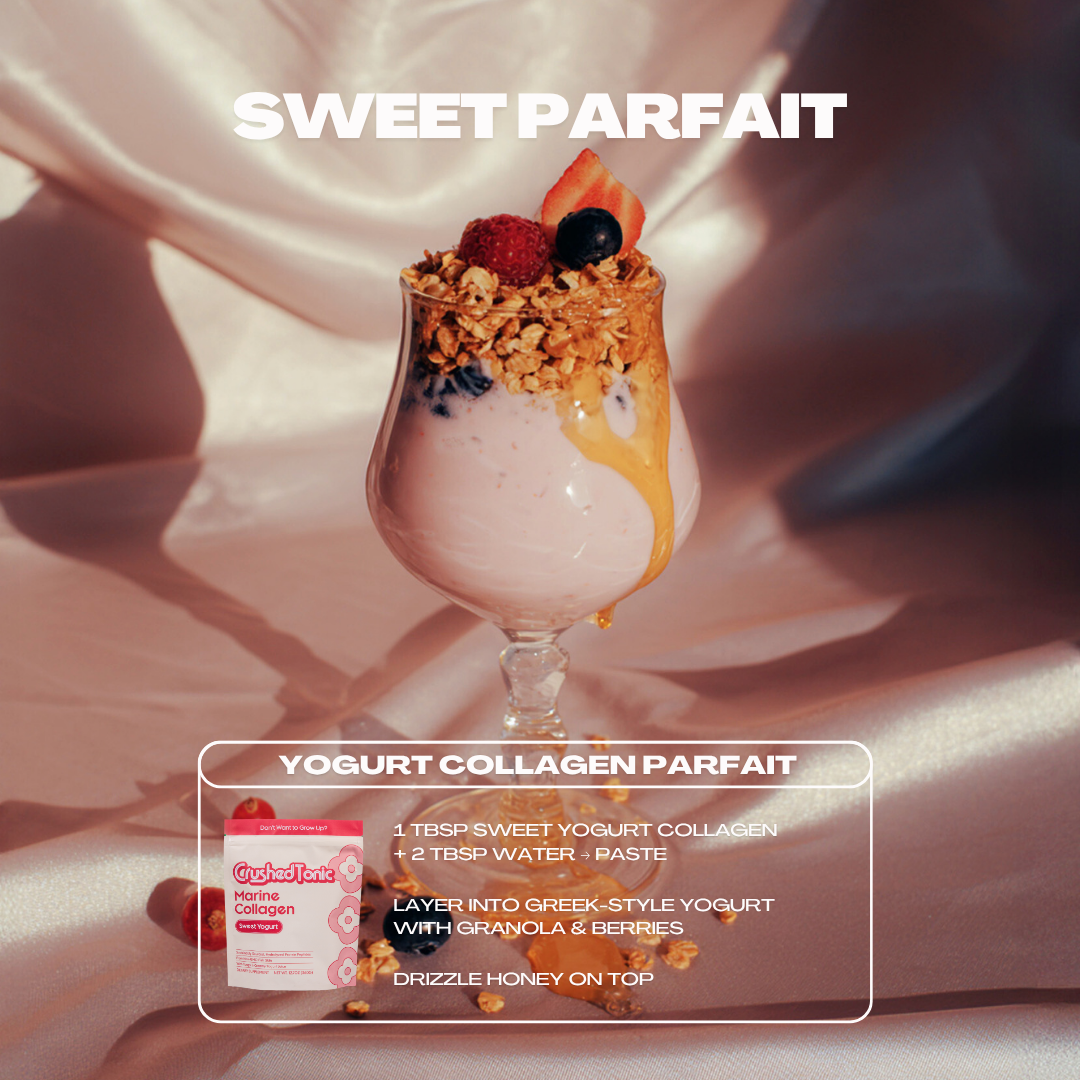
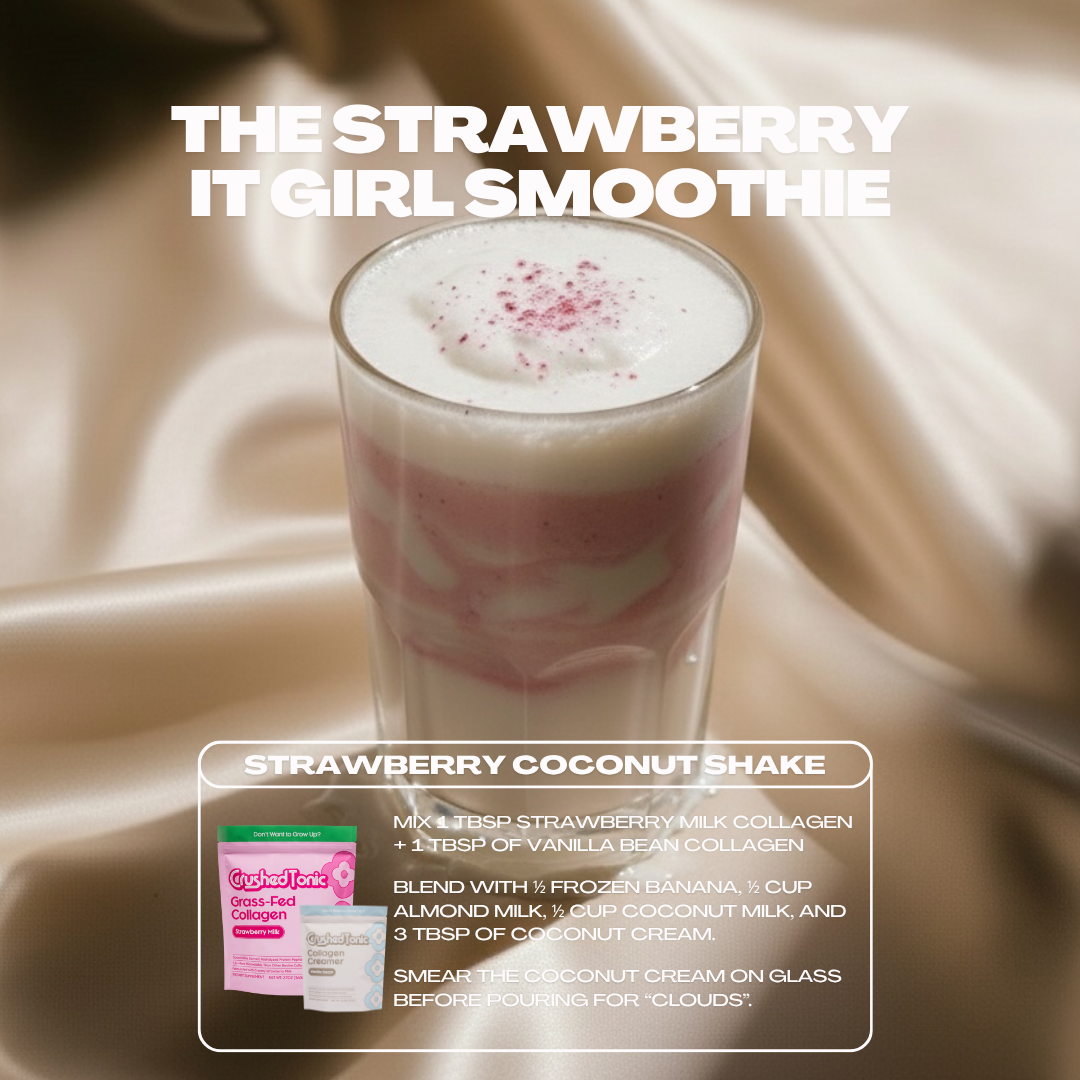
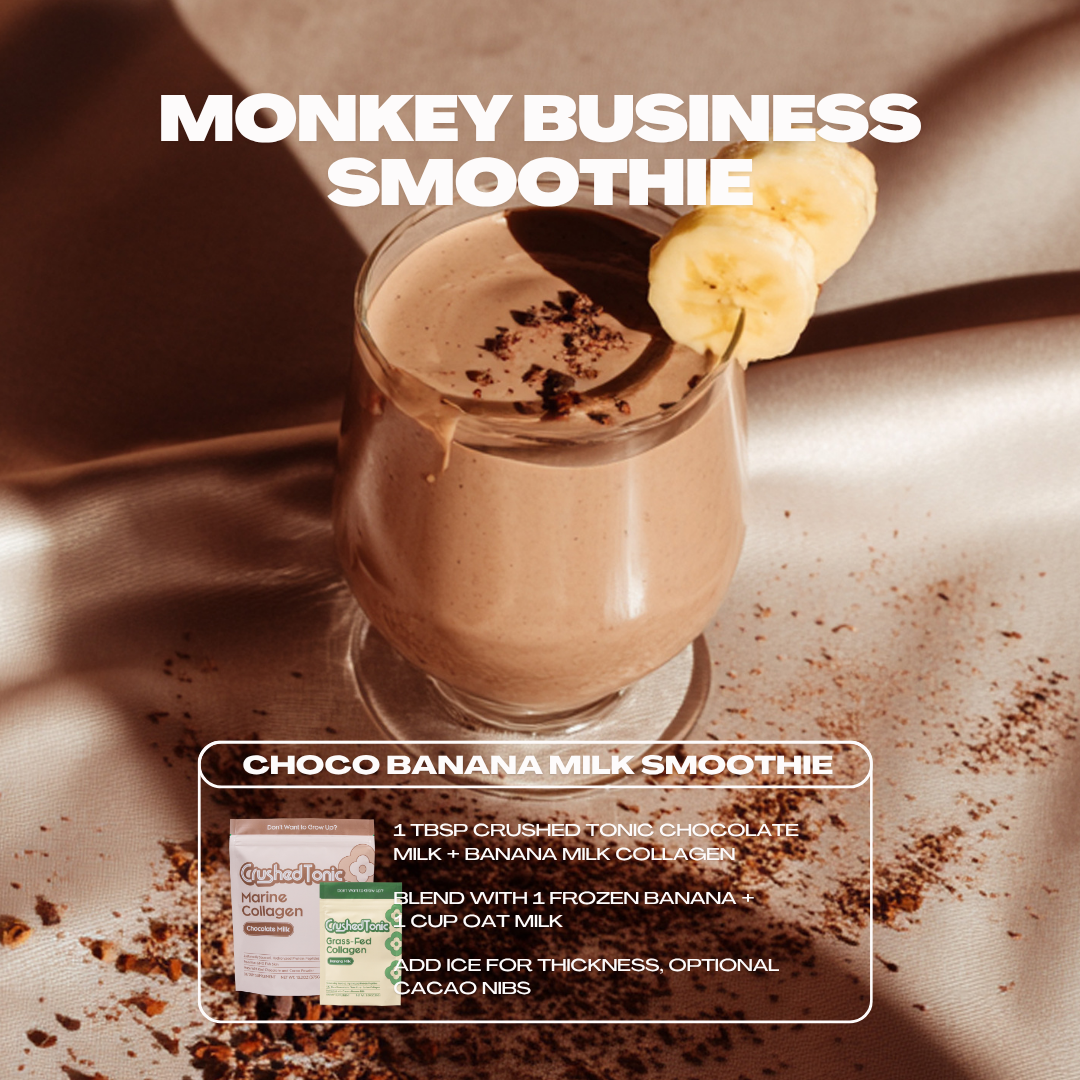
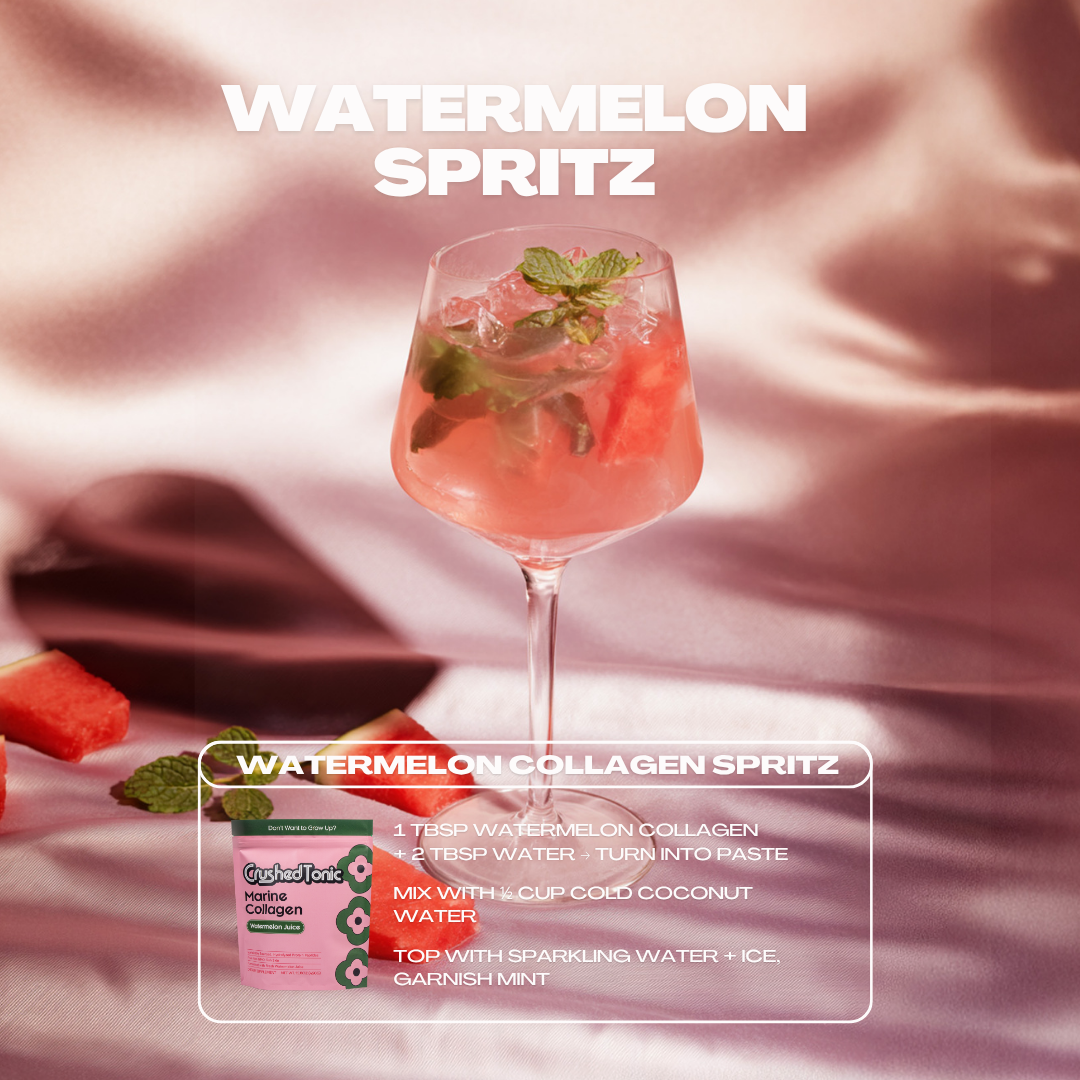
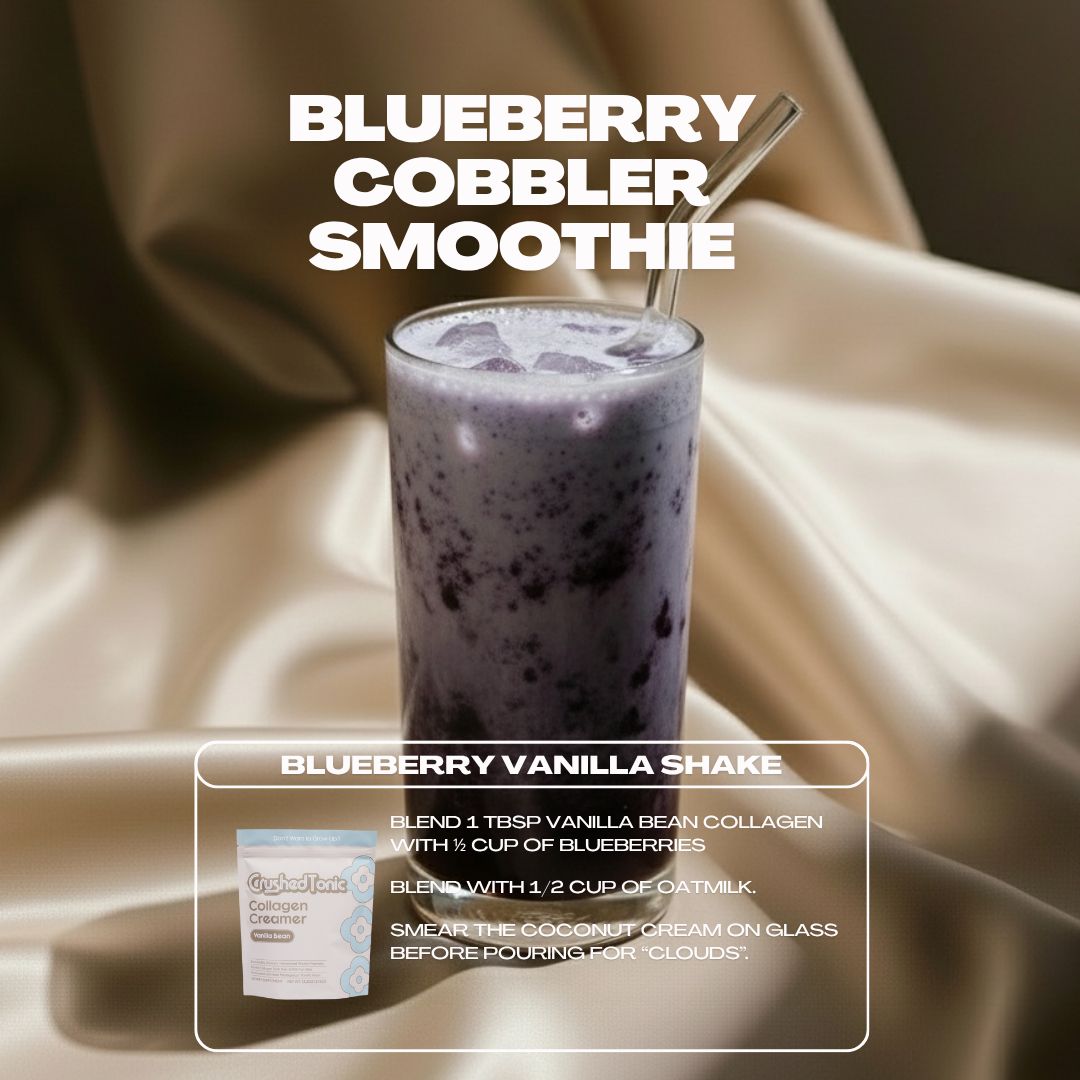






Have you ever wondered what you should be eating to get beautiful skin? Instagram star and former model Sally Olivia Kim reveals what she eats to keep her skin glowing and how she boosts collagen in her diet
My obsession with skincare started when I got burned from a cooking accident.
The oil melted the skin off both of my arms instantly, and I had to turn to prescription ointment and silicone patches, only to find none of it really did much for me. Unimpressed by the options out there, I ended up taking to the internet to find alternative ways to heal my skin.
After just a couple weeks, I saw incredible changes not just on my burns, but my entire skin, head to toe, and also my hair
After some research, I discovered that ingesting collagen was extremely beneficial for skin (and hair, bones and joints). I was fascinated—especially because I always thought collagen was something that was topically applied or injected— and so I started drinking it everyday.
After just a couple weeks, I saw incredible changes not just on my burns, but my entire skin, head to toe, and also my hair.

Image via Instagram: @sallsters
Turns out, collagen is something that’s in our own bodies — actually the most abundant substance in our bodies second to water—and our bodies stop producing it as much when we are in our mid 20’s. I believe drinking extra collagen, however, offsets that decline, returning your skin and hair to what used to be.
I then tried to evangelize it to my aging parents and family, and this was where I saw the problem. No one wanted to take collagen as often as I did and had I not been burned, I probably wouldn’t have drank it so regularly either.
But knowing how beneficial it was, I HAD to have my parents take it.
So I began to flavor the collagen powder with various superfoods—matcha for my mother, coffee for my dad, and hot cacao for my brother— and this led me to find out so much about all of the amazing ‘skin-healing’ foods out there, that we all should try to incorporate more of in our everyday diet for healthy skin and hair.
Here are ten that I try to consume as often as I can throughout the week:
Collagen
For those of you who are unfamiliar with collagen, it is a natural protein that our body produces. It is a major structural component of the human body (different types of collagen make up our skin, bones, muscles, and joints), and we depend on collagen to keep our skin plump, hair strong, bones healthy, joints lubricated, and digestive system working smoothly.
By our mid-40s, our collagen levels may have fallen by as much as 30 percent
And though our body is able to produce ample amounts of collagen when we are young, unfortunately, sometime after the age of 25, our bodily production of collagen begins to decline at a rate of 1.5 percent per year (in addition to the decline in the quality of our produced collagen).
By our mid-40s, our collagen levels may have fallen by as much as 30 percent. Without collagen, our cells lose structure, increasingly becoming weaker, stretchier, and thinner—and essentially, this decline is the true cause of many of our skin woes, such as wrinkles, fine lines, dark circles, dry skin, and cellulite.
But don’t worry; you can make up for the collagen you lose by consuming collagen, the foundation of healthy skin— and daily consumption of collagen has been proven to dramatically improve your skin, hair, and much more.
Collagen contains 18 out of the 20 existing amino acids found in our body— and studies have shown that these 18 amino acids, when ingested, support all of the different various functions of our body in different ways: our in addition to our skin and hair, it benefits the brain, bones, teeth, nails, heart, digestion, muscles, weight, mood, virility, and even sleep.
In 2015, researchers from France, Belgium and Japan found that in their two placebo-controlled clinical trials of daily collagen supplementation for eight weeks, skin hydration improved significantly after eight weeks, while the dermal layer of skin increased significantly 157 after only four weeks. Both of these effects from the collagen supplement lasted more than 12 weeks.
Collagen is sourced from fish, chicken, pigs, and cows— but it’s important to note that it is not in the fillet of a salmon or a piece of chicken breast—as collagen is found in the animals’ skin, joints, bones, cartilage and muscle tissue.
Koreans predominantly ingest marine collagen (it’s common for a meal to include whole-roasted fish with its skin on) and lots of bone broth (most of our meals come with a bone-broth based soup) – and once or twice a week, we will have Korean barbecue (grilled pork belly).
Then there are other side dishes such as jellyfish salad and steamed octopus/squid. And more extreme collagen rich, specialty foods such as chicken feet and pork knuckles!
Americans typically do not generally eat these parts of animals— the closest we get to is bone broth, which is essentially just cooked collagen. And if you aren’t able to cook bone broth daily or lean on fish skin, there are supplements out there to fill that gap.
Suggested serving amount for collagen powder: 10 grams of collagen powder a day (marine collagen preferred, as it is smaller in particle size, therefore more easily absorbed by the body)
Serving suggestion for collagen powder: I like to add collagen powder to almost everything— teas, coffees, smoothies, and even soups.
Salmon
I like to have half a fillet of salmon at least once a day as it contains both omega-3 fatty acids and retinoids. Omega-3 acids increase the number of collagen and elastin fibers in aged skin, while retinoids are known to stimulate the production of new skin cells. And of course, we can’t forget collagen-rich salmon skin!
Kimichi, Kombucha, and other fermented foods
Fermented foods have probiotics are live cultures that help balance the good and bad bacteria in our gut. By supporting our liver, it allows for efficient excretion of radical toxins from our systems, probiotics help our skin become stronger, happier, and healthier.
Probiotics can help fight gut inflammation, help the body absorb certain types of nutrients, and keep the immune system in optimum shape. They may also help alleviate allergic and inflammatory skin disorders by increasing our immunity and optimizing digestion.
And how do these little probiotic soldiers help our skin? What probiotics do for our health and our skin, is almost immeasurable: our stomach, a.k.a. the second brain, is actually the ruler of our overall health. With probiotics, our stomach achieves that needed homeostasis much more easily.
I recommend you look to foods low in sodium and sugar for probiotics. Often, a lot of these fermented foods are prepared with things that aren’t quite so great for you, such as salt, and then packed with preservatives. I take my probiotics in powder form.
Matcha tea
Matcha is a great source of anti-aging antioxidants called catechins, which support your liver’s detoxification process, while the overload of caffeine from coffee can stress out your liver even more. Green tea can also prevent enzyme activity that breaks down collagen.
One of the most well-known catechins is called EGCG for short, and it’s especially great for skin. In one study, EGCG was proven to minimize keloid scars in size in addition to successfully preventing a bigger buildup of new blood vessels that would feed the keloid scar.
Because matcha is loose powder, it sometimes does not mix well in just cold water. If you don’t have an electric whisk, I suggest you mix the matcha powder into a reusable water canister with about 6 oz of cold water. Once you shake a few times, the matcha will dissolve perfectly! Then, mix the matcha elixir into a mug of warmed up almond milk. Aim for about two grams of matcha daily.
Turmeric
Turmeric is an ancient root packed with curcumin, a substance with powerful anti-inflammatory and antioxidant properties. Curcumin is known to boost our immune system’s defense mechanisms, enhance metabolism, increase our white blood cell count, aiding against bacteria and viruses, and support in our liver detoxification process.
By supporting our liver and ensuring that it doesn’t have to work too hard (if your liver is constantly struggling to eliminate toxins such as alcohol, sugars and other chemicals such as medicine out of your body, it will become worn out, and take longer to push these said toxins out).
This prevents your liver from doing its job as well, causing your body to store toxins for longer than it should. This build up can cause your skin to break out more. Curcumin is also reported to increase our body’s collagen synthesis, in addition to helping aid cell regeneration (which allows for faster wound healing in skin).
I love heating up a cup of almond milk / coconut milk and adding turmeric with a pinch of cinnamon and ginger powder, then black pepper on top. Aim for two grams daily of turmeric.
Oranges and other citrus fruits
Citrus fruits such as oranges, limes, lemons and grapefruits are rich in vitamin C and have the ability to help amino acids—specifically lysine and proline—convert to collagen (and we know by now that more collagen means plumper, more hydrated skin overall).
More importantly, without vitamin C, our body actually struggles to synthesize collagen– so not only is it helpful for our skin, it’s integral! Im One study, published in 2007 in the American Journal of Clinical Nutrition, found that people who consumed about 5 milligrams of Vitamin C daily for three years reduced the appearance of their wrinkles by 11 percent.
Apple cider vinegar
The acetic acid in vinegar has been shown to assist with weight loss due to its ability to inhibit lipogenesis (the formation of fat cells), which is known to lower both waist size and BMI.
The acidity of the skin is essential for enhancing the antimicrobial barrier
Maintaining the skin pH below 5.5 is vital for suppressing the growth of microbes that cause pathological skin infections, including Staphylococcus aureus. The acidity of the skin is essential for enhancing the antimicrobial barrier. Many people use cider vinegar as a way to keep the pH low.
I like to take about 2-3 tsps of ACV a day in the morning (since you haven’t had any other foods yet, your body will absorb rate), diluted in filtered water, with a little bit of fruit juice (my favorite one is pineapple).
Sweet potatoes
Sweet potatoes are packed with beta-carotene, antioxidants that convert to vitamin A, once consumed– which are great for encouraging the growth of skin cells and elastin in our bodies. And because our skin will see things like hyperpigmentation (uneven skin tone) and dry skin without enough vitamin A in our bodies, it’s essential that we get enough Vitamin A in our diets.
Coconut oil
Fats and oils are actually great for you – especially for your skin – if they are the right kind. I love having a spoonful of coconut oil a day – Coconut oil is packed with antioxidants that help regulate your hormones and make you feel balanced overall throughout the day. With better sleep, less stress, and less junk-food in your system, your skin will feel more refreshed and rejuvenated – and look even better.
Tomatoes
Tomatoes contain lycopene, a natural carotenoid that fights cellular damage and skin inflammation – it helps our body recover from UV rays.
Almonds
Almonds contain magnesium, a mineral that our bodies rely on to produce hyaluronic acid, an integral component of our skin. Hyaluronic acid sounds foreign, but it’s actually a naturally-occurring acid found in our body that acts as a lubrication agent for our hair and skin.
Hyaluronic acid boasts of similar properties as collagen, and plays a critical role in the health of our skin (especially in keeping its moisture levels high, with its impressive ability to hold up to 1000 times its weight in moisture).
Filtered water
Lastly, for your skin to look dewy and glowing, it needs to be hydrated at a cellular level. Usually, dry skin is caused by dehydration of the body or malnourishment of certain fats. So, remembering to drink enough throughout the day is really important.
Depending on the season and climate, you should aim to drink at least 6 cups of filtered water daily. However, some mistake all water to be created equal— it’s not. There are contaminants, microorganisms and unknown radicals in tap water that can harm your skin (both topically and internally).
remember that not consuming certain foods is just as important
Of course, there are so many other superfoods out there that we should consuming more of everyday. However, it’s not the easiest to always be balancing various food groups when you have such a routine– so turn to meal prepping and supplements to fill that gap.
And of course, remember that not consuming certain foods is just as important– so stay far away from sugars and foods that your body cannot digest or process well.
Collagen’s benefit on skin
In another study, a hydrolyzed collagen supplemental drink also containing hyaluronic acid and essential vitamins and minerals given to postmenopausal women had anti-aging properties. The women showed significant and positive effects on skin wrinkling, elasticity, and hydration.
Collagen supplements may also help improve the appearance of cellulite
Collagen supplements may also help improve the appearance of cellulite. In a German and Brazilian study in 2015, doctors gave 105 women who had moderate amounts of cellulite an oral supplement of 2.5 bioactive collagen peptides over the course of six months.
At the end of that period, the women’s dermal skin layer had greater density, and they had a significant reduction in cellulite and in waviness in their thighs. The effects were more pronounced in women who were not overweight.
Collagen’s benefit on hair
Because it contains the amino acid methionine, collagen may improve the appearance of your hair and nails and, possibly, even decrease hair loss.
In one study of 30 people with hair loss, in which one group received a preparation of amino acids together with a Vitamin B complex, and the other group received a placebo, the portion of hair in the growth phase was 10 percent higher in the methionine group than in the placebo group after half a year.
Sally Olivia Kim is CEO of Crushed Tonic and the author of new book The Collagen Glow – A Guide to Ingestible Skincare.
Born in Seoul, South Korea, Sally moved to Orange County, California, when she was ten years old.
In her past life, Sally was a model, an investment banker, a venture capitalist, and a digital strategist. Sally went to NYU and majored in English Literature, and loves to write screenplays and short stories.
Follow Sally on Instagram @sallsters
Your cart is currently empty.